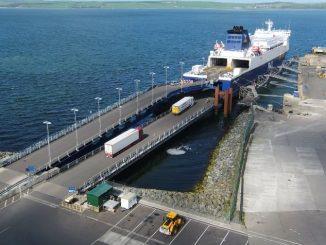
Getting groupage into Northern Ireland is “one of the hardest things to get right” a senior Cabinet Office official told a Parliamentary Committee this week.
In a meeting of the EU Goods Parliamentary Committee yesterday (9 February) Emma Churchill, head of the Cabinet Office’s Border and Protocol Delivery Group, told MPs that two modifications to the way groupage is taken into Northern Ireland (NI) are being developed in an attempt to prevent the serious delays groupage hauliers are facing.
Under the new Brexit regulations, loads into NI have to be certified and the trailer then sealed until it arrives at the border.
Sending groupage is particularly difficult under the new system, especially for products such as meat, milk and fish which now need to be certified by vets when moving from GB to NI and the Republic of Ireland.
When the certificates are issued the lorry trailer has to be sealed. However since groupage involves pick-ups from multiple warehouses trailer seals need to be broken, goods recertified and seals reapplied multiple times.
This creates a complex and time consuming process which has resulted in firms suspending certain groupage deliveries into NI.
Churchill told the Committee two methods of groupage are being trialled to help hauliers avoid delays to groupage deliveries.
Read more
- New guidance on groupage not enough to stop major delays at NI ports, warns RHA
- Logistics UK backs government plan to reduce delays to food freight entering Northern Ireland
- Give hauliers grants to cover cost of shipping empty trailers to Northern Ireland, Logistics UK tells ministers
She said: “The first is a consolidation hub where products arrive at specific premises where they are consolidated and certified as a single unit and then a single certification officer puts a seal on that final load. That can then be sent with confidence that it will get across successfully.”
She added: “There is also a linear model where hauliers pick up several consignments across multiple locations and there is a way that allows individual certification to happen along the way and equally gives confidence the load will make a successful crossing.”
Churchill added: “That is beyond the pilot stage and is being used and monitored very carefully as to whether it solves the issues.”
These methods are also being considered as a way of delivering groupage to the EU, Churchill said, adding: “Defra is liaising with the EU as well as Northern Ireland to see if that and other options can be used to facilitate the groupage model as we do recognise groupage is one of the hardest things to get right under the new requirements.”
Penny Mordaunt MP, the Cabinet Office Paymaster General, told the committee that the Cabinet Office is looking at extending the three-month grace period which exempts NI supermarkets needing full export health certification requirements on deliveries of meat and dairy deliveries.
Both Logistics UK and the RHA have warned that if the easements are terminated on 1 April chaos could ensue at the border.
Mordaunt said: “We are looking at options to push out those temporary easements and we also want to be focused on permanent easements and a lot of those are within our gift.”














